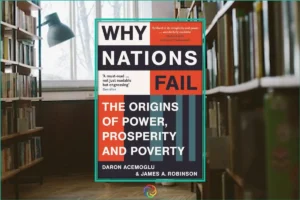
Why Nations Fail – The Origin of Power, Prosperity, and Poverty – Detailed Book Summary
‘Why Nations Fail’: A Comprehensive Analysis of Global Prosperity and Inequality ‘Why Nations Fail: The Origins of Power, Prosperity, and
Daron Acemoglu: Understanding the Forces That Shape Nations and Economies
Daron Acemoglu, born on September 3, 1967, in Istanbul, Turkey, is a Turkish-American economist and professor at the Massachusetts Institute of Technology (MIT). Renowned for his research on political economy, institutions, and economic development, Acemoglu is among the most cited economists in the world and a leading thinker on why nations prosper or fail.
After earning his bachelor’s degree in economics from the University of York and his Ph.D. from the London School of Economics in 1992, Acemoglu joined the faculty at MIT, where he has taught for over three decades. His work examines how political and institutional structures influence long-term economic outcomes, inequality, and technological change.
Acemoglu gained global recognition with the publication of Why Nations Fail: The Origins of Power, Prosperity, and Poverty (2012), co-authored with James A. Robinson. The book argues that inclusive political and economic institutions foster sustained prosperity, while extractive systems lead to stagnation and decline. Combining historical evidence and modern data, it became one of the most influential works in political economy of the 21st century.
His other major contributions include studies on automation, labor markets, and technological inequality. In The Narrow Corridor (2019), also co-authored with Robinson, Acemoglu explores how societies can maintain a balance between state power and individual liberty — a “corridor” essential to sustaining freedom and growth.
Acemoglu’s scholarly influence spans macroeconomics, development, and labor economics. He has authored more than 150 academic papers and several foundational textbooks. His research has been recognized with prestigious awards such as the John Bates Clark Medal (2005) and the BBVA Foundation Frontiers of Knowledge Award (2021).
In recent years, Acemoglu has become an important voice in debates about artificial intelligence and the future of work, warning that technology should augment rather than replace human labor. He advocates for policies that ensure innovation benefits society broadly rather than exacerbating inequality.
Daron Acemoglu’s work bridges rigorous empirical analysis and moral insight, emphasizing that economic outcomes are not predetermined but shaped by collective choices and institutions. His research continues to influence policymakers, academics, and citizens striving to understand and build fairer, more prosperous societies.

‘Why Nations Fail’: A Comprehensive Analysis of Global Prosperity and Inequality ‘Why Nations Fail: The Origins of Power, Prosperity, and

